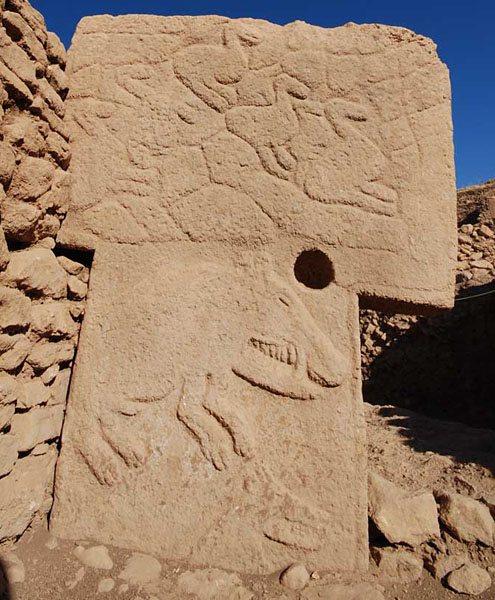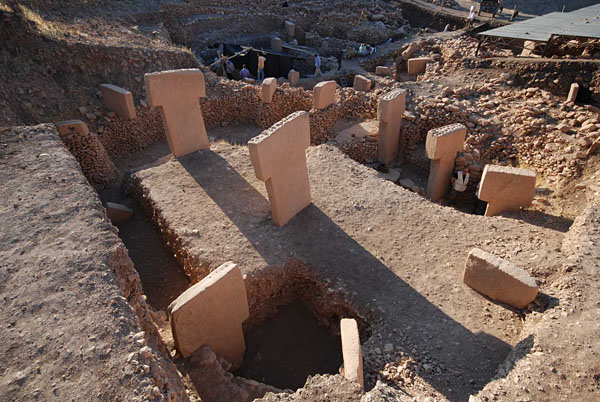In a 2009 posting entitled, "
Scientists See God on the Brain," Jeremy Hsu writes that recent studies suggest that religious thinking is linked to the higher functions of the brain and is part of our mental equipment. Religion is not, that is, a more recent invention designed to solve one problem or another. According to this theory of the relationship of religion to the brain, we are hardwired for religion. It is part of who we are.
 |
| A T-shaped pillar at Göbekli Tepe |
A
National Geographic article entitled, "
The Birth of Religion," lends some credence to this theory. Archeologists have discovered the oldest known monumental religious center in the world, located at Göbekli Tepe (pronounced Guh-behk-LEE TEH-peh) in eastern Turkey. The site dates back some 11,000 years to the Pre-Pottery Neolithic (PPN) era and consists of twenty or more rings of large T-shaped stone pillars, weighing several tons each, many of which are covered with carvings depicting various wild animals. It is an amazing site. Archeologists estimate that the construction of any one ring would have required 500 workers. The rings were built over several millennia, with a newer ring sometimes being built on top of an older one.
The thing is that Göbekli Tepe predates the development of agriculture and the rise of settled civilizations. The people that built it were hunter-gatherers who, according to previous archeological dogma, could not build something like this. Older theories assumed that only a large, sophisticated, agriculturally-based civilization would have the resources and technical knowledge necessary to build such an impressive site. They were, obviously, wrong.
 |
| Göbekli Tepe excavation site |
Archeologists also assumed that organized religion was an invention of later civilizations, which used it as a social control mechanism or, maybe, as a way for people to deal with the stress of civilized life. Göbekli Tepe, however, provides powerful evidence that PPN peoples developed organized religion before the rise of civilization. There's more: the dig also strongly suggests that organized religion not only pre-dated civilization but also may well have been a factor in its establishment. It appears that over the centuries the builders of Göbekli Tepe had to develop new food sources and a more settled life in order to live near to their monumental, religious center. They invented civilization so they could continue to occupy their monumental, religious center. It may not be too much to say, tentatively, that
in this case civilization did not invent religion for social ends so much as religion invented civilization for sacred ends.
That conclusion makes sense theologically. If, in fact, God initiated and remains present in the evolution of the universe and Earth, then it is reasonable to think that spirituality and the sacred are powerful, God-given human impulses that are a part of our evolutionary heritage. Supporting evidence comes from the study of chimpanzees, our close evolutionary cousins. Primatologist Jane Goodall is convinced that chimps display, "
an unadulterated sense of spirituality." God, in sum, created us as spiritual beings, and the more science studies us, our past, and the realities of our universe, the more evidence of that fact it will uncover. Amen.

